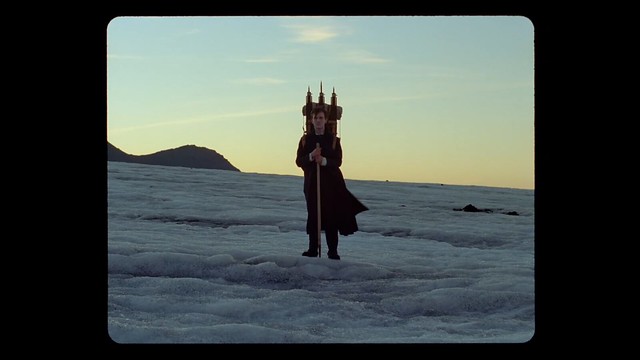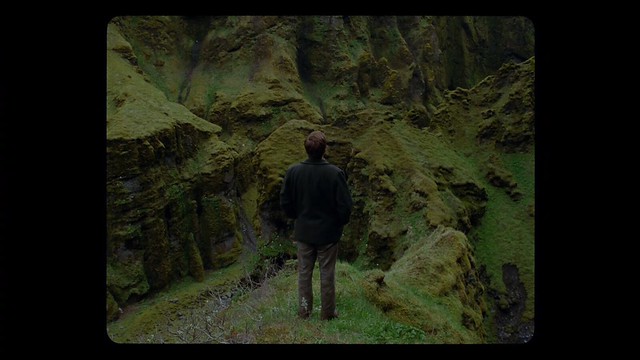









 Godland, directed by Icelandic director Hlynur Pálmason, is inspired by the first photographs found in the early settlement in the southwest of Iceland. The film has an awe-inspiring, majestic setting characteristic of many films shot in the active volcanic island nation. Indeed, everywhere Pálmason and his DP Maria von Hausswolff points their camera to, in its full frame portraiture style, the film is cinematic as hell. But it's not the gentle, sun-kissed nature we see in Terrence Malick films. Rather, it's an unforgiving, overwhelming, and downright threatening environment. There's little poetry or lyricism. Matching that backdrop, the film is not about one man's admirable, unwavering faith or enduring love. It's about guilt, envy, pride, prejudice, distrust, lust... in other words, humanity in a nutshell, and its insignificance against Mother Nature.
Godland, directed by Icelandic director Hlynur Pálmason, is inspired by the first photographs found in the early settlement in the southwest of Iceland. The film has an awe-inspiring, majestic setting characteristic of many films shot in the active volcanic island nation. Indeed, everywhere Pálmason and his DP Maria von Hausswolff points their camera to, in its full frame portraiture style, the film is cinematic as hell. But it's not the gentle, sun-kissed nature we see in Terrence Malick films. Rather, it's an unforgiving, overwhelming, and downright threatening environment. There's little poetry or lyricism. Matching that backdrop, the film is not about one man's admirable, unwavering faith or enduring love. It's about guilt, envy, pride, prejudice, distrust, lust... in other words, humanity in a nutshell, and its insignificance against Mother Nature.
Young Danish priest Lucas (Elliott Crosset Hove) is ordered to travel to Iceland, which was a remote Danish Territory back in the late 19th century, to build a church for the small Danish settlement there. He is assigned a translator (Hilmar Guðjónsson) who is a half Dane and half Icelandic, and a small crew of Icelandic laborers. With his clunky large plate camera set up always tethered to his back (with upside down tripod sticking out over his head and shoulders like some sort of a religious artifact), he is an uneven match against scruffy crew of seasoned working-class journeymen.
When they get to the shore of Iceland, they hook up with Ragnar (Ingvar Sigurdsson), a brutish Icelandic man, as their guide. Ragnar's down-to-earth workingman ethics and his local knowledge of the land is a stark contrast to Lucas's nebbish priest from the so-called civilization. They don't see things eye to eye on many occasions.
At first it seems reasonable to trek the rugged surroundings, as they soak in the beauty and adventure spirits. But things fall apart quickly when they reach a river crossing. Against Ragnar's advice, Lucas orders the party to cross the raging river. Some of the horses carrying the supplies get swept away in the rapids, resulting the drowning of the translator whom the priest built a sort of friendship with. Wrecked with guilt, Lucas has a nervous breakdown shortly thereafter, and falls gravely ill. It is Ragnar who carries Lucas, tied to the back of the horse, all the way to the settlement.
Lucas is recovered in the care of Anna (Vic Carmen Sonne) and Ida (Ída Mekkín Hlynsdóttir), two daughters of Carl (Jacob Lohmann), a statesman of the settlement who helps build the church next to his home. Carl is stupefied for the fact that Lucas and his crew came all the way on foot, rather than sail to the settlement which would be much easier and faster. “To see the land and get to know its inhabitants?” he muses, puzzled.
Lucas is smitten by the older daughter Anna. Carl, sensing there is a weakness in Lucas’s character, warns her not to get close to him. These people come and go, he says. But Anna secretly yearns to go back to the motherland, back to civilization.
As the church construction is near completion and Ragnar and his crew is about to head back to their dwellings, things get tense between Lucas and Ragnar. First Lucas scoffs at the idea of Ragnar being interested in Christianity. They confront each other at a local celebration where they take part in traditional wrestling match in front of all the settlers and laborers. Then Lucas refuses to take photographs of Ragnar as a parting gift. Lucas’s deep seeded prejudices comes bubbling up to the surface. These Icelandic savages don’t deserve God’s love. Ragnar counters with extreme measures.
With its circle of life ending, Godland is a contemplation of us humans’ fleeting existence on earth. In a true Herzogian sense, with large brushstrokes, Pálmason draws a grand allegory that we are after all, elemental. And it's magnificent.
No comments:
Post a Comment